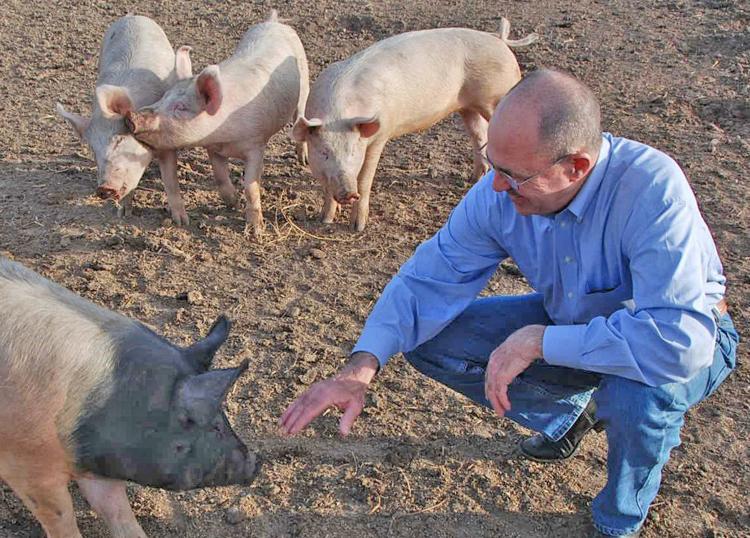Wisconsin Gazette: Trump’s ag relief program will benefit factory farms, not family farmers

Consumers will continue to have fewer choices as independent family farm agriculture declines, says Mike Callicrate, who has served on the HSUS National Agriculture Advisory Council for the past three years.
Photo: HSUS
by Kitty Block | Jul 30, 2018
What many commentators have cast as President Donald Trump’s predilection for trade wars has certainly caused consternation and even outrage as it has become clear that more tariffs on exports of American farm products would result in major losses for the agricultural sector.
That was especially true for meat products exported to China, such as pork and chicken. Responding to the outcry, the president announced a $12 billion relief package — what we might rightly call a — to offset the effects of tariffs on American farm products.
But it’s become clear that the money in play won’t benefit independent American family farmers, including those who embrace high standards of animal welfare and environmental sustainability. Rather, the funds will largely benefit the major players of industrial agriculture, including multinational corporations, industry associations and their lobbyists, and operators of large factory farms that confine thousands of animals in miserable conditions and pollute the environment.
Today, I’ve asked two leaders of our National Agriculture Advisory Council, Carrie Balkcom and Mike Callicrate, to weigh in with their views on the president’s move and what it means for family farmers and the animals they raise. Mike is the owner of Callicrate Cattle Company and Ranch Foods Direct, a company that sells high-welfare food products. He has served on the HSUS National Agriculture Advisory Council for the past three years. Carrie has worked in agriculture for most of her life, and she serves as executive director of the American Grassfed Association. She is also the current chair of the HSUS National Agriculture Advisory Council.
How was President Trump’s escalation with China affecting livestock producers who count on the export markets for their bottom line? Are they typically producers who reject industrial animal agriculture?
Carrie Balkcom: Traditionally, the farmers and ranchers that we represent do not qualify for this “bailout”, nor do they want to, since they are focused on feeding their communities, not the world at large.
Mike Callicrate: Family farm producers don’t benefit from export markets. If their production is exported, they don’t receive additional value because there is no market. The high welfare producers we support need fair market access in the U.S., not access to what are most often lower priced export markets.
Will the independent family farmer, who values animal welfare and sustainability, benefit from the program?
CB: Not that I’m aware of.
MC: No. Because there is no market, only the multinationals will benefit through their ability to siphon off the bailout money through charging higher input costs to farmers and/or either lowering or maintaining low output prices paid.
What does this have to do with the welfare of animals raised for food?
CB: Nothing.
MC: It’s a bailout that advantages the biggest industrial producers in supporting lower inputs in the way of corn and soybean costs. A case of supporting what high animal welfare advocates do not want. The producers we advocate for don’t feed much industrially produced corn and soy.
What are its implications for consumers who want to support humane animal husbandry with their dollars?
CB: The bailout is coming from tax dollars, so all consumers should delve into the ramifications of what their dollars are paying for.
MC: They will continue to have fewer choices as independent family farm agriculture declines.
This is targeted not just to animal products, but other commodities as well. Will that translate into lower costs for independent family farmers when they go to buy feed and other necessities?
CB: No.
MC: Not necessarily. The companies that buy and sell commodities that are processed into feed are like the big retailers. They don’t lower prices when costs are reduced.
I think most family farmers would happily pay other farmers more for the grain they produce if they had access to a profitable market for the livestock they raise.
A Chinese counter tariff on pork has no impact on our biggest pork company, Smithfield. It’s Chinese owned. China imposes the tariff, which goes right back into their own pocket. But it sure does hurt Smithfield’s competitors.
Until a fair, open and competitive marketplace is restored, any bailouts (subsidies) will go to the same companies that have been plundering and pillaging up to now.